In March 2020 beloved writer, poet and former children’s laureate Michael Rosen was in an induced coma after contracting COVID-19.
It was touch and go whether the 75-year-old would pull through. The damage done to his body was extensive. He had blood clots on his brain and in his lungs and his oxygen saturation levels were dangerously low – 58 when they should be 95.
For several months, including 40 days in the coma, NHS staff at the Whittington Hospital in London cared for him as he battled to survive.
Now on the road to recovery, Michael spoke to UNISON head of health Sara Gorton about his ordeal, during an online event attended by UNISON health workers from across the east of England (Sarah and Michael pictured below).
He spoke of the NHS staff who went out of their way to help him, the crucial little acts of kindness that made him feel human when, he says, he was “little more than a cadaver”, and his utter disbelief at the government’s controversial recommendation of a 1% NHS pay rise.
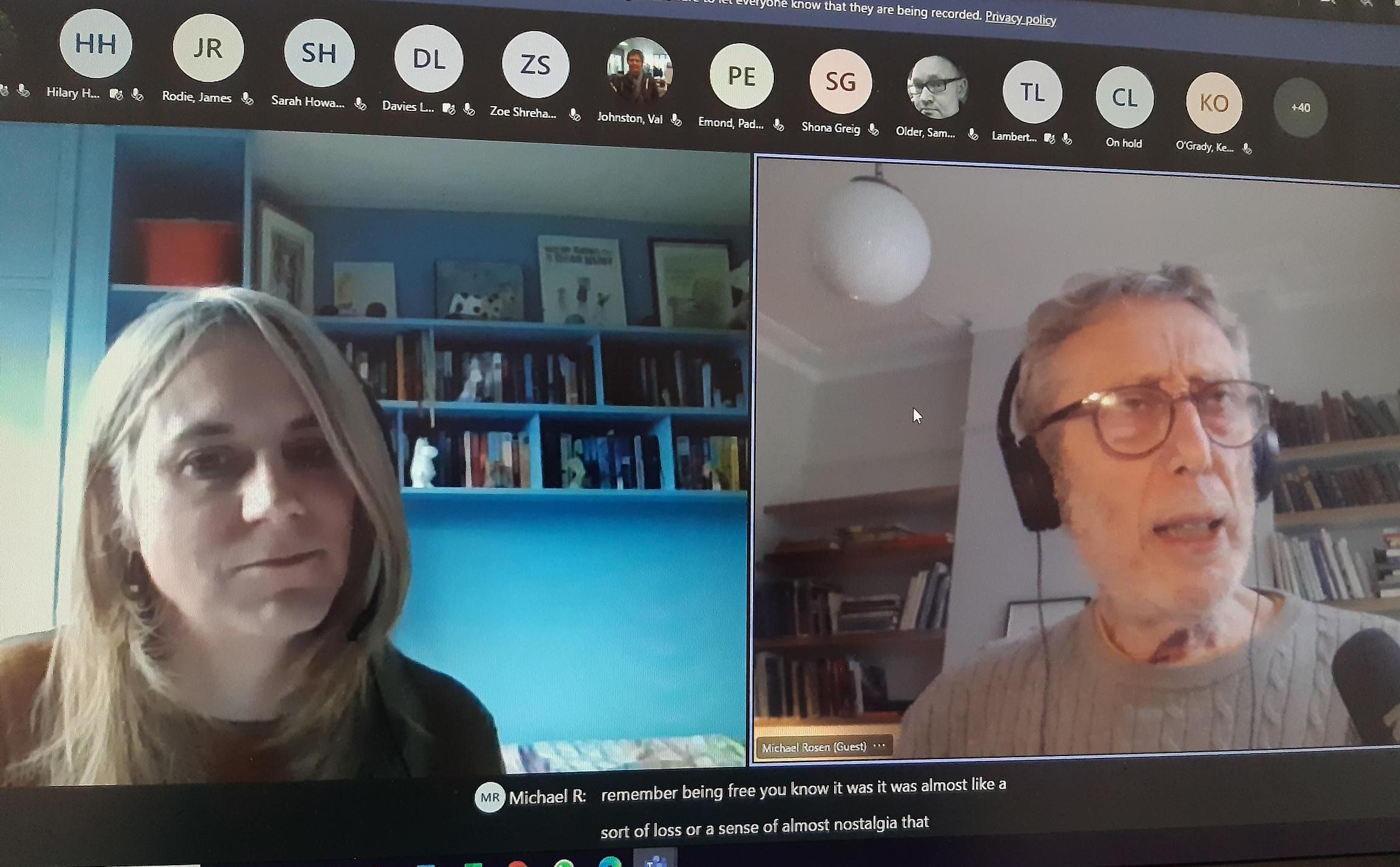
As with all COVID-19 patients who are put into a coma, staff treating Michael kept a diary of the conversations, treatments, visitors, moods, movements and thoughts happening around him as he lay unconscious. When he awoke, it offered a link to the world he’d missed or, as he calls it, “a window into my life when I was dead.”
Reading from the book he’s written about his COVID experience, Many Different Kinds of Love: A story of life, death and the NHS, which merges poems with entries from that patient diary, Michael turned to one particular note, from a nurse:
Good morning Michael. It’s a pleasure to look after you. I’m Pat, a lung nurse specialist currently working in ITU to help the wonderful ITU nurses looking after you.
It’s lovely to see all the photos of your family, smiling and showing how much you’re loved. We’ll keep you comfortable and talk to you throughout the shift, to let you know what we’re doing. My kids were brought up on your poems and loved them. We’ve given you a lovely wash and brushed your thick hair.
Devotion and humanity
Those little acts of kindness – such as saying good morning when there was no prospect of him answering, or brushing his hair – had a profound effect on him.
“As parents we look after our children when they’re ill, then we do something beyond that. We stroke them, we ask them if they need this or that. We do lots of things that aren’t medical. We give them the paracetamol, then we do other things to show we care.
“When I look back at those nurses, and having read the diary, I realise they did all the things I’ve done for my kids, but they’re not my parents. I think, ‘why?’ Professionally they’re using all their knowledge, their skills, their experience, but they’re adding something else beyond.
“One nurse spoke to me about Arsenal, the football team I support, and Derby County, the team she supports. Another described me thrashing around in the bed and they were concerned so called the doctor. This level of care is beyond my comprehension.
“I’m not that good a person. I can do it for my kids, but the idea that these complete strangers are doing that for me is overwhelming, amazing, incredible.”
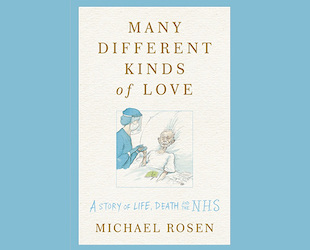
Michael described his time in hospital as being an extreme form of isolation from his old life. He was a body to be prodded, poked, tested and observed. It was a million miles away from his other world, where he made the decisions about when to eat, when to move, when to speak.
But as his condition improved, the devotion and humanity of the NHS staff helped him shake-off the understandable grumpiness that comes with losing control.
Michael emotionally recalled how during his subsequent rehabilitation at St Pancras Hospital, also in London, a nurse’s casual reference to a 1947 Warner Brothers cartoon character made him feel human again.
“I remember a conversation that will stay with me for the rest of my life. The senior nurse at the rehab centre said she could wangle it so my wife and family could come to see me.
“She said I’d be able to see my Tweetie Pie, and that if she was me, she’d want to see her Tweetie Pie, but she can see him this evening when she goes home. So clearly, she calls her bloke Tweetie Pie!
“She spoke to me in such a beautiful, familiar way about her and her husband and me and my wife, with those sweet little words Tweetie Pie. It was so human, so lovely. When you’re in hospital, in isolation, anything personal is incredibly valuable.”
A state of shock
With his blood pressure falling, Michael remembered how receiving the Daily Mail with details of the government’s 1% pay recommendation for NHS staff had an immediate effect on his condition.
“At first I thought it was some kind of absurd joke. That it was a mistake, maybe it was 11% or 21% and someone had left a digit off. I couldn’t believe that after all that waffle from ministers about how grateful we are, that the NHS is wonderful, and that health workers should be supported with applause, that this was the result.
“I just assumed that with the will of the people behind them, that when the pay review came around it would be linked to inflation or more. Certainly something less contemptuous and less contemptable than 1%.
“I was in a state of shock. The reward for all those hours represented in my book is really nothing, 1% is nothing. It isn’t a pay award at all. The end result for all those people who looked after me is to stay at exactly the same level.*
“There’s no goodwill from the employer, which is the government, which is us. The government have blocked the country’s sense of gratitude for what NHS staff have done. It’s as if we’ve said, ‘we love you NHS’ and the government have said, ‘Not so fast, no we don’t.”
One of the many consequences of the pay offer is that it could further demoralise staff already on the brink of leaving the health service. With close to 90,000 vacant posts in the NHS, those remaining will be under greater pressure to do more with fewer resources.
Michael is supporting UNISON’s campaign for all health staff to receive a pay increase of at least £2,000, to reward them for the work they’ve done and to attract new staff to the health service.
* If inflation rises above 1%, the government recommendation becomes a pay cut. In April it stood at 1.5%.
Words: Garfield Myrie
Michael Rosen’s official website
Prime minister should admit the government’s big mistake on NHS pay

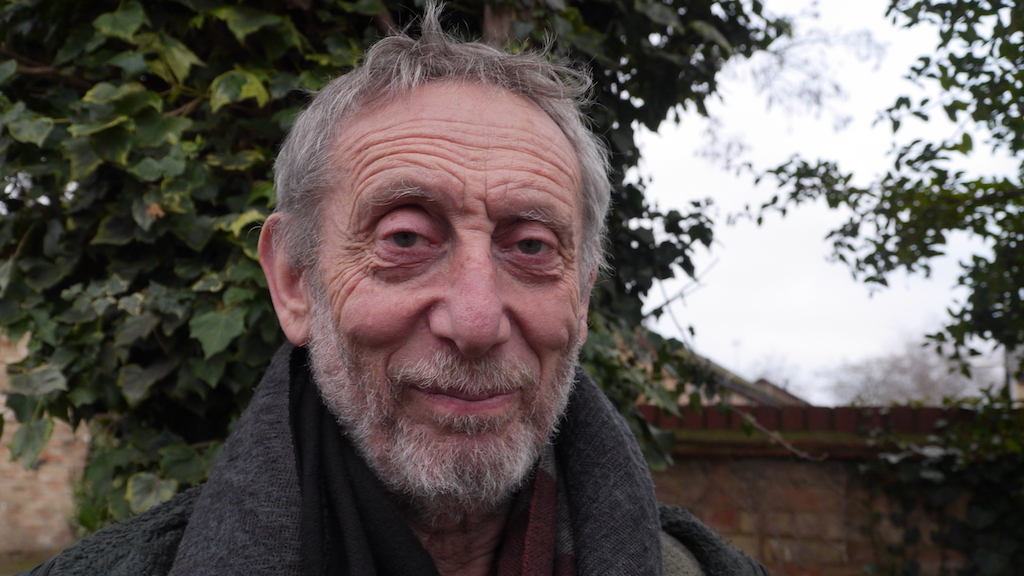
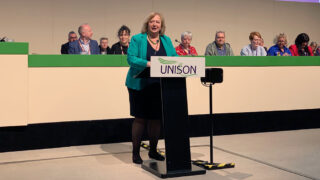
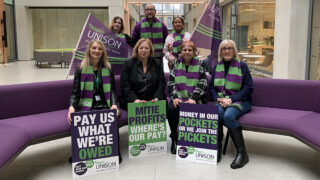
Such a moving account of Michael’s care and treatment from our wonderful NHS staff – I am sure I am not alone in backing his condemnation of the Governments inability to recognise the true value of our wonderful NHS – Boris and his cronies should be ashamed of themselves!
Reading Michael’s words here has genuinely moved me to tears. Everyone should read his book
What a moving story. Yes, this is a vocation and not just a job. People were very isolated when in hospital during the height of Covid-19 and often extremely ill. I applaud the staff at all levels who cared for them, above and beyond their actual jobs.
I have worked for the NHS for 20 years and I have loved it, Covid has put so much pressure on an already pressured job and yet we all pulled together and worked out new working practices to make things work, We should all be so proud of our Doctors and Nurses but equally to all Admin staff and porters and cleaners and catering staff because without all staff working together we would never have gotten through this terrible time. the Government should be ashamed at what they have offered but even without a decent pay award the NHS staff are an amazing dedicated group of people that want to pull together and we all put 100% into all we do every day.
A great account for anyone who has worked for ‘local authorities’. Having retired following head injury I continue to applaud all those who continue to be ignored by the general public and carry on. To my dismay large numbers of ‘staff’ working around G7 have been unable to obtain vaccinations! I remain a unionist and socialist. Roll on a new government!
I back Michael Rosen 100% and everyone else who might be campaigning for a better pay-rise for the NHS staff working during the pandemic or at any time, really! SO glad Michael is still with us to delight us with his poetry, and delightful words on the radio.
Every good wish Michael.
I’m really touched by the story I’ve been a Carer for 30 years I started in my 20 I loved my job but I fear the government does not care about nhs front line services and carers which of been a Carer for many years I go above and beyond my job as I love helping people but I feel we and the people we look after are not cared about any more
I totally agree with the sentiments. I feel very lucky not to have had any symptoms of Covid myself and really feel for the people who, like Michael, have had to endure this. I somehow feel fortunate that I have only been diagnosed with cancer in February this year. I was part of a track and trace team for Camden, as a Council employee via redeployment from the library service before knowing I was ill, I then undertook lateral testing for council staff and then staff and pupils at a school, so have seen and heard how awful this virus can be. I’m currently on long term sickness and it has become very apparent that the NHS nurses were overworked and under paid. This really hit home when I spent almost a week in UCH cancer ward, the staff were so attentive but really under pressure, due to the amount of shifts they had to undertake and lack of a full team of staff. They still maintained their smile and personal interaction with patients and carried on, even when near exhaustion and frustration, they took verbal abuse (which I overheard) from some patients too, which was awful to hear. I was, like Michael, and am still, so grateful to the medical staff both at UCH and at Macmillan Cancer Centre, alongside my GP. They have kept me positive throughout and although I can’t beat the cancer, with their help, I can keep it under control.
I supported Michael’s new children’s book that he and Cole Henley are currently writing/sketching during Covid titled “You’re Thinking About Tomatoes” If like me, you enjoy Michael’s work visit Unbound to support the book too. I also support the campaign to give NHS staff a valued pay award and sincerely hope they get it along with further increases annually. Thank you NHS, for also supporting me up to now and in the future.
Everything I read here deserves to be more widely circulated, and well beyond UNISON’s magazine.
Let’s hope the motivating writing in Michael Rosen’s book finds the wider audience I have in mind. Congratulations Michael and your family and congratulations to all staff in ALL parts of the NHS for your continuing, inspirational efforts.
Thanks to an amazing man for directing what must seem like very precious energy in this way. When I read something like this it does make me feel like I can continue to fight againt all unjust treatment for public sector workers.
Wonderful NHS staff and all scientists who worked tirelessly to produce vaccine s to protect us from Covid. Thank you to doctors, nurses and other support staff . Thank you to all involved.